What Philly Women Need (By Philly Women)
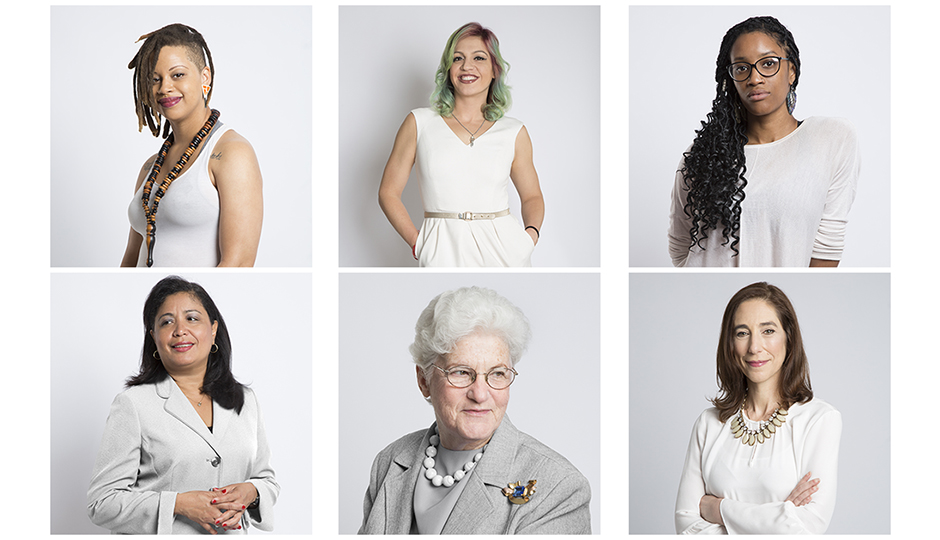
Clockwise from top left: Shani Akilah, Timaree Schmit, Danielle Currica, Tracey Welson-Rossman, Lynne Abraham and Maria Quiñones-Sánchez | All photographs by Nell Hoving
Philly has been a man’s town for too long. And hey, not to point fingers or anything, but maybe that’s exactly what’s wrong with this place.
Given that women actually make up a majority in Philadelphia — 53 percent, yo — not to mention the state of the world today (you know: 50,000 women taking to the Philly streets last January in protest; your mom joining Pantsuit Nation; Wonder Woman as the superhero du jour), it felt like the right moment to talk about women. To talk to women. And so we did. We asked a wide range of females (and femmes) in this city — teachers, lawyers, activists, mothers, dancers, singers, entrepreneurs, politicians, writers, wives, sexperts — what should come next. What would make their lives, and the lives of other women, better in big and small ways? What, exactly, would they do if they were in charge?
Here, the women have their say.
1. Women need to rethink how we spend our time.
Laura Vanderkam, author of I Know How She Does It: How Successful Women Make the Most of Their Time and 168 Hours: You Have More Time Than You Think
I’d love if women would start thinking of their lives in terms of weeks instead of days. People always tell me, “There aren’t enough hours in the day to get to everything I want to do!,” which is true. But we don’t live our lives in days; we live our lives in weeks. Think 168 hours instead of 24 hours, and everything changes.
First, we see how much time we have. People with full-time jobs often think they have no time for anything else, but this isn’t true. If you work 40 hours and sleep eight hours a night — 56 per week — this leaves 72 hours for other things — which is kind of a lot of time. Second, it opens up possibilities for achieving at work and home instead of seeing the two as pitted against each other. Rather than fretting over working late two nights, you celebrate the five you’re home. Rather than looking for the perfect time for exercising every day, you look over the whole of the week and find the open spots where it can go. I think society often foists on women in particular the narrative that there isn’t enough time for everything, which is true in the sense that there isn’t time for everything. But with the right perspective, there’s more than enough time for whatever is most important to you.
2. How about a co-working space with babysitting?
Erin Elmore, political correspondent and QVC travel expert
I’d love a place where, when you need a few hours to get work done, you can go, take your child, and do what you need to do. The balance for working moms is so hard. How nice would it be to have a co-working place with good wi-fi and access to printers where you can bring your kid to have fun while you do your thing without being interrupted, without a kid hanging off you, for just a few hours? You’d pay a drop-in fee. You’d get a little more balance.
3. Hey, let’s write some checks.
Lynne Abraham, attorney and shareholder at the firm of Archer & Greiner
I’m mad as hell. I really am. I can’t believe what is happening in this country with women and where we stand as citizens. I’m mad as hell about Planned Parenthood. I’m mad that this president and Congress would try to send us back to a place we should never be. I’m mad as hell about the status of women, with half the mind-power in the world being thrown away, even in advanced countries.
I think marches are good, protests are good. But they aren’t enough. Women don’t appreciate the kind of power that we have; we haven’t used that power yet. Here’s what needs to happen: Someone who represents a large group of women needs to say, “Okay, ladies, we’re going to start a political action committee. We’re going to meet once a month, and every time we meet, you’re going to contribute $100. And then I’m going to Senator X or Congressman Y and I’m going to say: ‘I represent 4,000 women, and we have $50,000 in our PAC, and we’re going to work to defeat you. I represent power in the form of votes and money. And if you don’t pay attention to us, you’re gone, brother. You’re going to go down in flames at your next election unless you listen to us.'” Write a check. That’s what politicians understand. They all know how to count.
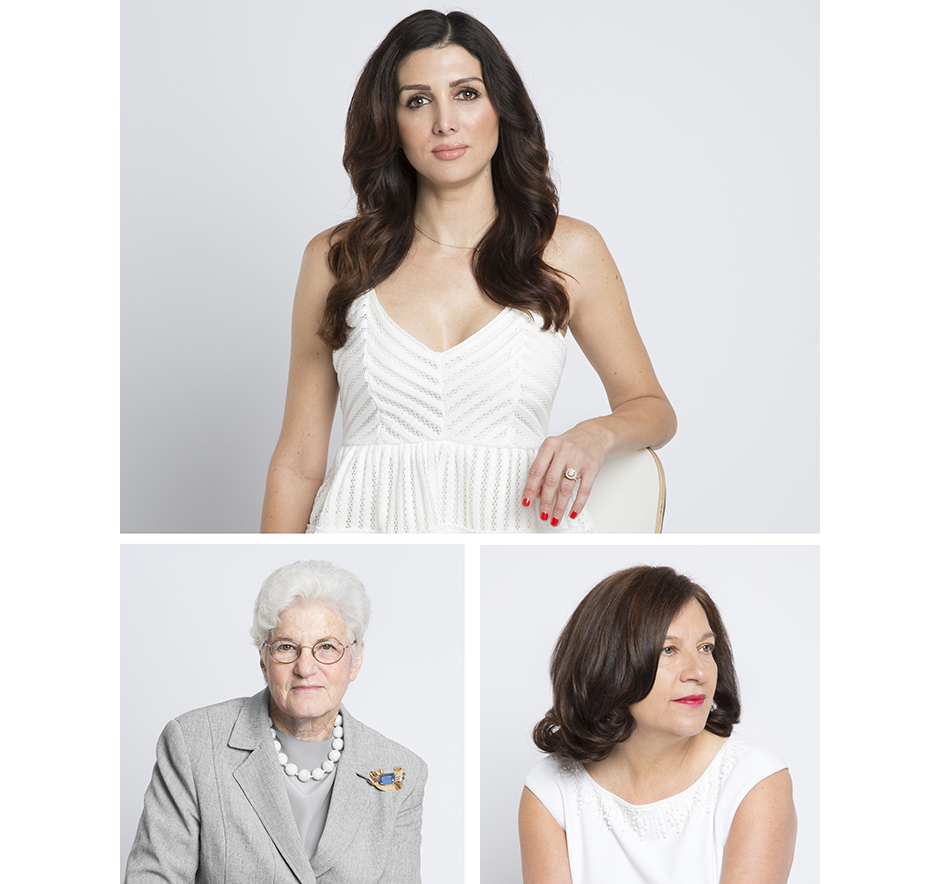
Clockwise from top: Erin Elmore, Ellen Weber, Lynne Abraham | All photographs by Nell Hoving
4. It’s time that women get our businesses funded as often as men do …
Ellen Weber, executive director of Temple University’s Fox School of Business Innovation and Entrepreneurship Institute and executive director of Robin Hood Ventures
Across the country, only three percent of venture capital funding goes to women-led companies. This isn’t a Philly problem; it’s a VC problem. But here’s the thing: Women are much more capital-efficient than men are. That’s not a stereotype — there’s plenty of data that shows this. In fact, Josh Kopelman, who runs First Round Capital, has said that of all the companies in their portfolio, those that included a female founder performed 63 percent better than all-male counterparts. So you would think VCs would be more inclined to invest in women-led companies … but they’re not.
Why? Generally, investors like to invest in people who are solving problems that they understand. Since VC capitalists have typically been white men in their 40s and 50s who went to Ivy League schools, guess who gets funded? You look at someone like Dana Donofree, CEO of Philly company AnaOno, which creates lingerie for women going through breast cancer. To get funding, she has to walk into a room with 75 men and explain an underwire bra. They look at her and go, Hmmmm. Then she walks into the room with a number of women in it — a couple of whom have had breast cancer — and they’re all like, Wow. You see? The issue is that most angels and VCs think of women entrepreneurs somehow differently.
So what would make a difference locally? More male and female angel investors looking at early-stage companies that have women in the C suite. We also need more VCs actively engaging with gender-diverse start-ups early on, and investors exploring their unconscious biases to ensure they give women entrepreneurs a fair view.
5. … Though that won’t happen until we finally earn 100 cents on the dollar (all of us).
Archna Sahay, director of entrepreneurial investment for Philadelphia
You hear a lot about the lack of people of color or women — or women of color — as business founders. You won’t achieve a strong measure of diversity on the founding side, however, if you aren’t simultaneously addressing the funding side. But venture investing is a highly risky form of investing — much riskier than traditional stocks and mutual funds. To even get to a place where you have enough income to be an angel investor or a venture capitalist probably means you’re making 100 cents on the dollar.
According to a 2016 Pew report, white women make 82 cents on the dollar. For black women, it’s 65 cents. Fifty-eight for Hispanic women. Aside from the blatant inequality factor here, you see core infrastructure issues standing in the way of amassing enough wealth where you could even look at private investments as a way to participate in the economy.
The Mayor’s support of the wage equality bill sent a signal to Philly women that he’s supportive of more economic equality. Sure, I can see both sides of the argument about the bill, but I’ve also been that statistic. I made 80 cents to my male counterpart’s dollar at one point. We both had the same title and same responsibilities. This was when I worked in the private sector; they said it was because I didn’t have a graduate degree. He did. But we did the same work, at the same level. They hired me because I could do the work.
So what are some solutions? I’ve thought of things as small as taking all names off résumés. What if we just look at skill sets before we call people in for interviews? It might keep employers from forming preconceived notions at that early point. Maybe we also change how we determine pay. We put a number to the work that’s being produced, as opposed to assessing the value of the credentials behind the work. What is the ROI of the work? Base the pay on the value of the job, not the person doing it. It would be a start.
Ultimately, income equality is about freedom. Freedom to invest in new ventures that are shaping the future of how we live. And freedom to say no to a job that doesn’t pay fairly because there are other jobs available that do.
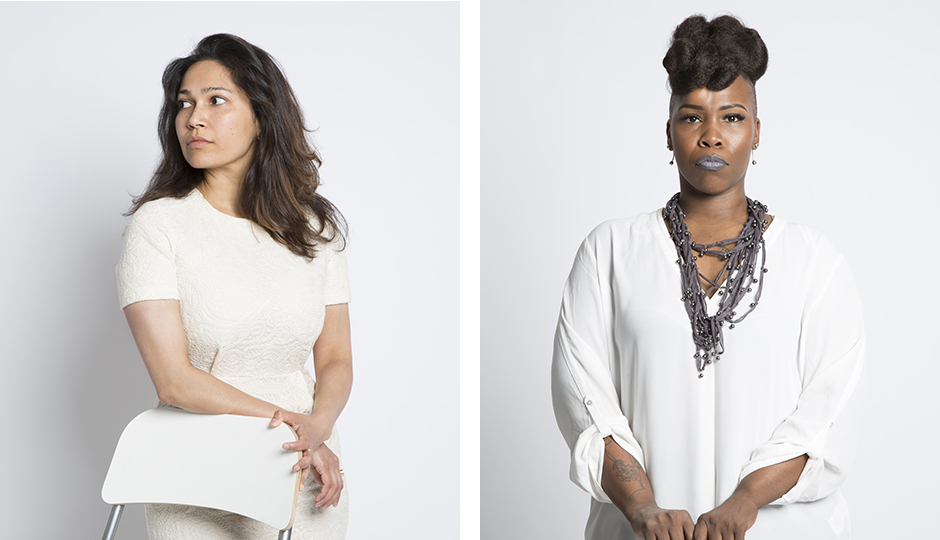
Left to right: Archna Sahay and PJ Brown | Photographs by Nell Hoving
6. Feminine hygiene products in public bathrooms should be free.
Danielle Currica, dancer, teacher and burlesque performer with Philly’s Peek-A-Boo Revue
Does it really make anyone that much money to charge a quarter for a tampon in public bathrooms? Chances are, the majority of women who need these very basic things are probably homeless or struggling, as opposed to me and most women I know who carry a purse full of supplies.
7. Don’t. Touch.
PJ Brown, singer, barista, makeup artist
I’m sick and tired of people feeling like it’s okay to invade my space. I’m not just talking about the Hey, babies from the side of the street. I’m talking about someone tapping you on the shoulder when you have headphones in just because he wants to talk to you, to say, “You from around here?” I literally had a man grab my arm on the street one day. I took my earbud out, thinking he must need to tell me something important. No — he was just like, “How are you today?” I said: “Don’t you touch someone without their permission. What’s wrong with you?” And you know what he said? “Where you going?”
This happens all the time. I watch it happen to women every day. It’s rude. It’s not safe. It breaks rules we were taught way, way, way back as kids. But some of us have forgotten, I guess.
8. Can we stop insisting that being single in our 40s is a liability?
Brandi Davis, owner of Child and Family Coaching
I was at a family party a little while ago, and I overheard my cousin talking about me: “She is so lovely. I just want her to find someone to spend her life with and not be alone,” she said, clutching her heart.
Look, I’m not going to lie and act like I hate relationships. I don’t. I like being in a relationship. But I’m also happy flying solo. I guess I’m just surprised that in a city as big as Philly, concerns over my singledom are so prevalent. Cabdrivers, bank tellers, my dentist, neighbors … they’re all very concerned. I’ve created a successful business. I’m on TV. I teach classes and run a blog and have friends and family and a place of my own. But in 2017, the focus is still on my singlehood. So: Married friends, family, cabbies, men I don’t know but who seem to want to comment on my life: I am seriously okay. We are all seriously okay.
9. Though a few more places to meet non-millennial men would be cool.
Brandi Davis
Side note: So where is a decent place for a totally fulfilled Philly woman to meet a smart, awesome 40-year-old man when she happens to want one?
10. Let’s give each other a break. You know, the way we do for men.
Maria Quiñones-Sánchez, City Councilwoman
Philly women need to lighten up on each other, to ease up on the level of perfection we demand of each other. When a man omits details or makes a mess, we say it’s just because he didn’t have time, or was looking at the big picture, or will get to the details later — not because he has fundamentally failed to have his life together.
We need to judge each other more on substance and less on presentation. As long as a man’s outfit doesn’t feature freshly spilled food, it’s not likely to be a topic of conversation. I wish that were true for us, too. A wardrobe that never repeats outfits and an unlimited blowout budget aren’t requisites for success, and we shouldn’t treat them that way.
I think we need to demand a little less of each other and do a little more for each other. We need to make allowances, clean up after each other sometimes, accept imperfection, and recognize the enormous effort we make. As a wife, the mother of two men, a grandmother of a beautiful boy — really, we need to treat each other the way we treat the men in our lives. Maybe I’ll make this my next New Year’s resolution.
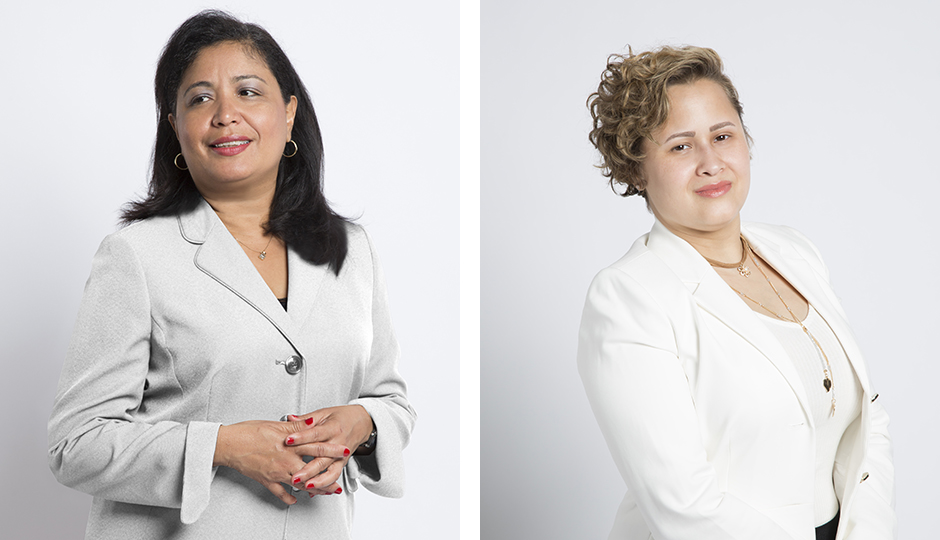
Left to right: Maria Quiñones-Sánchez and Siria Rivera | Photographs by Nell Hoving
11. And stop being mean girls.
Siria Rivera, director of Two Generational Programming at Diversified Community Service
What really gets under my skin is seeing women turn their backs on each other. I grew up being the only girl in the house. It wasn’t until I entered the workforce that I was really exposed to the whole catty dynamic, and wow, was it ugly. A decade later, I’m still wondering the same thing: Why don’t we support our women the way we support our men?
Let me be clear: I have many amazing and supportive women in my life. But my circle is pretty tight, and I don’t see that changing anytime soon. I’m not insinuating that all of the women in every workplace or on every committee or board should become the best of friends. Friendliness does not equate to respect in my book. What we need from each other is respect and honesty, to be up-front and center. Also: this past presidential campaign? Ha! The epitome of women not supporting women.
12. And focus on finding our ya-yas.
Judith M. Von Seldeneck, founder and chairman of Diversified Search
Despite what one might think, the 1970s were a good time to be a woman in business in Philadelphia. The environment was right for women entrepreneurs, but there was still a lot of field yet to till. Founding a group called the Forum of Executive Women, which is still going strong today, seemed to be a good idea, and we had our first meeting of 60 women at the Racquet Club. Of course, I had to make the reservation under my husband’s name, because those kinds of private clubs didn’t admit women then. They do now.
It wasn’t about leveraging relationships or taking advantage of access or personal gain or whining about the obvious inequities and discriminatory practices. There were no agendas. It was about something far simpler and more fundamental: fostering a feeling that you weren’t alone, that you were in it with somebody else who understood what you were up against, and that together we could overcome. We found strength in numbers, and found that together we had a voice, which we started to use. We could be heard in politics, in business, on issues that were important to us. We started donating to political campaigns. That got candidates’ attention. Money always does.
Over time, I became close with a small cabal of women who became my lifeline as I built my business. Eventually we jokingly came to call ourselves the “Ya-Yas,” after Divine Secrets of the Ya-Ya Sisterhood, and we became each other’s collective sounding board, confidantes, counselors and cheerleaders. As I look around at the millennial generation of women today, I see so much energy, so much promise. But all that drive and verve can fool you into thinking you can do it all alone. You can’t. You shouldn’t. And you don’t have to.
There’s unique, contagious, inspiring energy when women come together for the common good, however they define it. To millennial women, I say: Make sure you find your ya-yas. Keep them close. Listen to them. Learn from them.
13. Let’s talk more about what we want. Sexually speaking.
Timaree Schmit, sexuality educator
We need to stop talking about sexuality like it’s just the act of having sex, and we need to stop acting like pleasure is only valuable because it’s rare and difficult to obtain. Intimacy, connectedness and wanted touch are demonstrably real human needs with measurable benefits to our mental and physical health.
Sexuality touches on every facet of our lives. It’s the core of autonomy — we each get to decide how we identify, what we prioritize, and what happens to our bodies. Unless these choices are mine and mine alone, I am not free. Many institutions perpetuate the idea that pleasure is a luxury — or a vice — as a means of social control, coming down harshest on the citizens with the least power. This is why we don’t talk about sexual pleasure to young girls. Instead, we tell them that sex is something only men want and that women’s value is in being “hard to get.” Truly caring about what women want is the baseline of consent, and it’s the only way to take down rape culture.
Right now, we don’t give girls agency, we don’t value their wishes and desires — and that echoes out into the rest of their lives and the choices they make in education, career and relationships. We need to talk openly and unashamedly about who we are, what we desire and what makes us happy … and encourage the same in others.
14. How about a little stroller parking?
Holly Waters, personal trainer and co-founder of Fitness Alive
Talking as a mom here: We live in a tight city, with small stores, small restaurants. A lot of these spots, there’s no way you’re getting a stroller in there; it can be impossible to get in and out of places you want to go if you’re out walking and have your child with you. So: What about stroller parking? Like bike parking, but with a design that’s specifically stroller-friendly.
15. Safer streets would be a big load off our minds.
Nicole Marquis, owner of HipCityVeg, Bar Bombón and Charlie Was a Sinner
I fear walking alone in the city at night. Well, not where I live, Rittenhouse, but that’s because it’s always well lit and populated. But I’m born and raised here, and on nearly any small street, I’m constantly looking over my shoulder. I lived for five years with my grandfather at 5th and Olney, and I would literally run from my car to the house door.
I wish the streets could feel safer. Maybe if there were more cameras in public spaces, that would provide some level of security. I’d also like to see more police on the streets — men and women in uniform, walking around. When I was a student at Temple, they had these blue-light stations all around. What some public panic buttons in the city would do for our sense of safety! Self-defense is good, too — I used to do karate. But I’d like it not to come to that, you know?
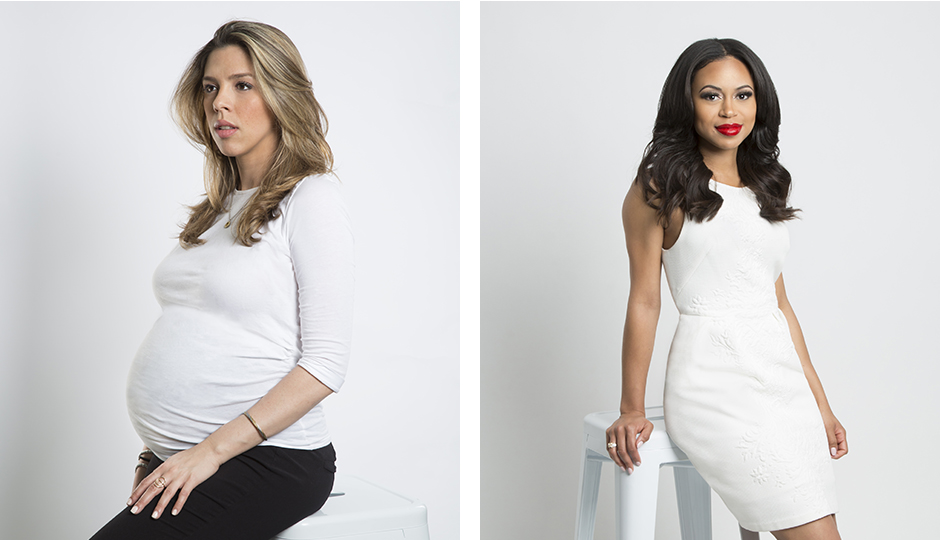
Left to right: Nicole Marquis and Alex Holley | Photographs by Nell Hoving
16. And free self-defense classes wouldn’t hurt.
Alex Holley, co-anchor of FOX 29’s Good Day Philadelphia
I’m from Irving, Texas. The police department there has these RAD — “rape aggression defense” — classes. My mom took one and loved it. She says, “I know I can take someone down now.” She feels safe. The idea of a self-defense class — offered for free by the police department — really connected with me. Remember Carlesha Freeland-Gaither? She was abducted a few years ago, taken violently right off the Philly streets. It was caught on tape. She was returned 72 hours later. But I remember how intense it was, watching her get pulled off the street, wondering what must have been going through her mind. Doing the news and seeing abductions and attempted kidnappings … well. Penn and Temple have self-defense classes for college students. But I think it’d be good for us all to have that resource, and have it be free, so there are no barriers to better safety.
17. There’s money waiting for us in tech. Let’s get it.
Tracey Welson-Rossman, founder of the nonprofit Tech Girlz
One of the surest ways to advance and secure women’s role in society, politics and other arenas is through economic empowerment. But when you look at the jobs traditionally dominated by women, they’re in lower-paying careers. Ninety-eight percent of dental hygienists are women. Eighty-seven percent of teachers and 82 percent of social workers are women. These are important jobs with real impact, but they’re not high-paying careers.
Unfortunately, there’s been a 35-year decline in the number of women in tech. And that stems from how we’re educating our girls. Studies have shown that as early as age six, girls don’t see themselves as being good with technology. Because of that, they tend to opt out of math and science by middle school. But we’ve also seen that when you put a robot or computer in front of them, it changes their opinion about what they’re capable of. And that — changing girls’ views about what they can and want to do — is what we do at Tech Girlz.
An intern at Facebook makes $8,000 a month. Sure, not everyone wants to work at Facebook or land in Silicon Valley. But tech is also in medicine, in virtual reality, in gaming, in cybersecurity, in fashion and smart fabrics, like the work they’re doing at Drexel. If we allow our girls to see the creative, diverse ways tech impacts different professions, it will change lives down the line. We’re talking about more women designing products, commanding higher salaries, maintaining more flexible schedules.
Dads in tech have been the biggest supporters of TechGirlz because they understand the opportunities. They know there are 500,000 job openings in tech-related fields right now, and one million projected for 2020. They understand that exposing their girls to technology early empowers them later. We need to do a better, faster job of inspiring half of our population to reach for that brass ring.
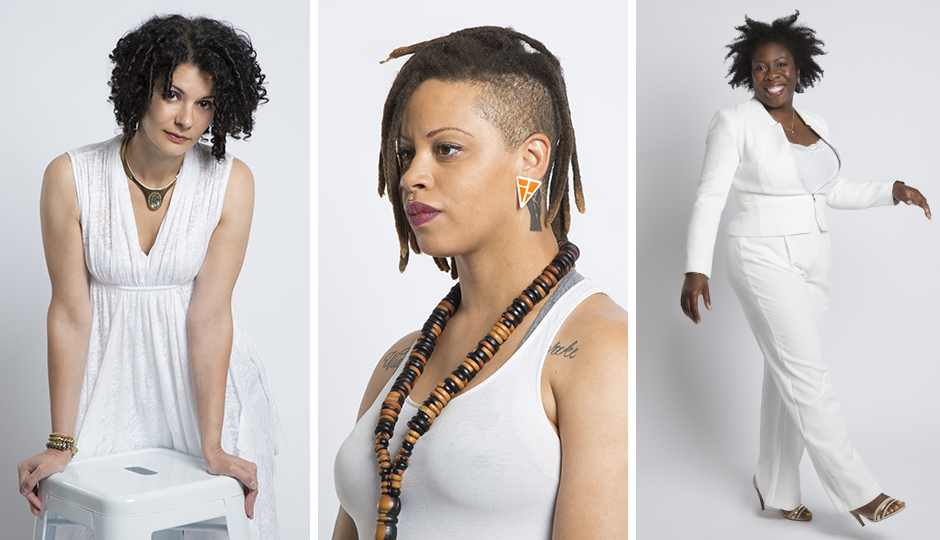
Left to right: Jerilyn Dressler, Shani Akilah and Jumoke Dada| Photographs by Nell Hoving
18. Meanwhile, women in tech? Please speak up.
Jumoke Dada, founder of Tech Women Network
There are definitely not enough women of color in technology. And those of us who are here, well, a lot of us — myself included — have been behind the scenes for so long that we’ve gotten comfortable there. But the start-up scene has changed things: It’s a show-yourself culture. You typically see advocates, visionaries, marketers, non-technical founders, etc., and they’re all great to see; the more, the merrier. However, we need to see a more balanced representation of the techies (or “technistas,” as I call us) — the women with the technical skills — in the forefront. Because we’re here. We build servers, databases, cloud environments. With the start-up culture being what it is, and with this need for more women — particularly women of color — in tech and pursuing STEM degrees, we need to see these women.
There are tons of events, meetups, calls for speakers, but you end up seeing the same few representatives at everything. Thank you to everyone on the front lines of the conversations, because every voice matters. But there are so many more women to glean from, especially those that work in technical roles daily. So I say: Come forth and speak up, women; I want to see you, and young girls need to see you, in this new tech world.
19. Same goes for women — and femmes — in activist circles.
Shani Akilah, creator/co-founder of the Black and Brown Workers Collective
I think women and femmes are almost always pushed to margins in movements. It’s interesting to see: We’re running the labor movement for freedom, yet our voices are pushed to the side during direct action, with men acting like we need to be protected when we’re the ones who started it.
There’s a lot of focus on getting arrested for being on the front lines or being the loudest voice at every march — positioning yourself as a leader. But the movement isn’t meant to be led by just one person. It’s meant to be led by the people. I’ve witnessed a lot of cis men talk down to and at femmes and women during marches. There are men building names for themselves off the labor and strategy and organization of black women and femmes, who are rarely recognized and given credit. And I think you see this a lot, from the Black Lives Matter movement to the queer liberation movement.
I always think that patriarchy can be solved by cis men. They’re the ones with the autonomy and the privilege, the ones who can step aside so other voices can be heard. But I also think it serves us as a society for all of us to check our assumptions. For instance, I created the Collective, but so many people assume it was a man. That’s a product of socialization; we all get socialized similarly in this world. So we need to work to check those internal patterns in ourselves. I think starting there can help inform the rest of the societal transformation we want.
20. Women need more access to the big bucks. Especially black women.
Sara Lomax-Reese, president and CEO of WURD Radio
I read not long ago that it would take the average black family 288 years to amass the same wealth as a white family has today. This modern-day wealth gap has its origins in the founding of our nation, when free labor — chattel slavery — fueled the economic growth of America. These disparities have followed a natural trajectory to where we are today. When you overlay pay gaps and disparities of race and gender, it’s just magnified that much more for black women. And in a capitalistic society, if you don’t have capital, then you’re marginalized. That’s the reality. And it’s not about buying a big house or fancy car. It’s about having the money to make a real difference by supporting our institutions and transforming our communities. And if we as women, as black women, are not empowered financially, we won’t be at the table. Which means we can’t have the impact that we need to have, the influence to make a difference.
For black women, there’s social capital, and then there’s access to capital capital — and if you’re not operating in certain circles or spheres, you’re locked out. I’ve witnessed what can happen when you have people who want to see you win, not necessarily because you have the best business plan, but because they see something in you that they want to see grow and be successful. It’s a game changer.
So the question is, how do you create access and opportunity and begin to allow more parity to build wealth? At the end of the day, I think Philly’s institutions — corporations, the city, insurance companies, etc. — need to take the lead and make capital more available to qualified black entrepreneurs. We should all be vested in promoting diversity and sustainability to build our collective economic health and well-being.
We have a long, long way to go. Philadelphia is still the poorest big city in the country. But I’m optimistic. I know there are groups of African-American women who are doubling down on changing these specific disparities. Locally, there’s an organization called the Black Women’s Leadership Council — they try to amplify the voices of black women in Philly. The group has a lot of entrepreneurs, and there’s a specific focus on wealth creation and economic empowerment. I think there’s an interesting idea bubbling up there, specifically around aggregating money to help invest in black women’s businesses. It’s encouraging to me.
21. Changing tables are a must.
Hillary Weinstein, attorney
Speaking from a mother’s perspective, I’d love more restaurants to have changing tables. The number of times I’ve changed my child’s diaper on a hard bathroom floor is more than I care to count.
22. Bathrooms at playgrounds would help, too.
Samantha Matlin, clinical community psychologist and professor
It’s so great to have so many neighborhood playgrounds. But most of them don’t have bathrooms, and the ones that do are often closed. Most of us have had our kids squat in a corner at one point or another. I understand that upkeep is an issue; I know it’s complicated. But then, so is having a kid and no nearby toilet. I’m super excited about city initiatives like Rebuild, honestly. It might not create more bathrooms, but maybe it will help deal with the issues with the existing ones.
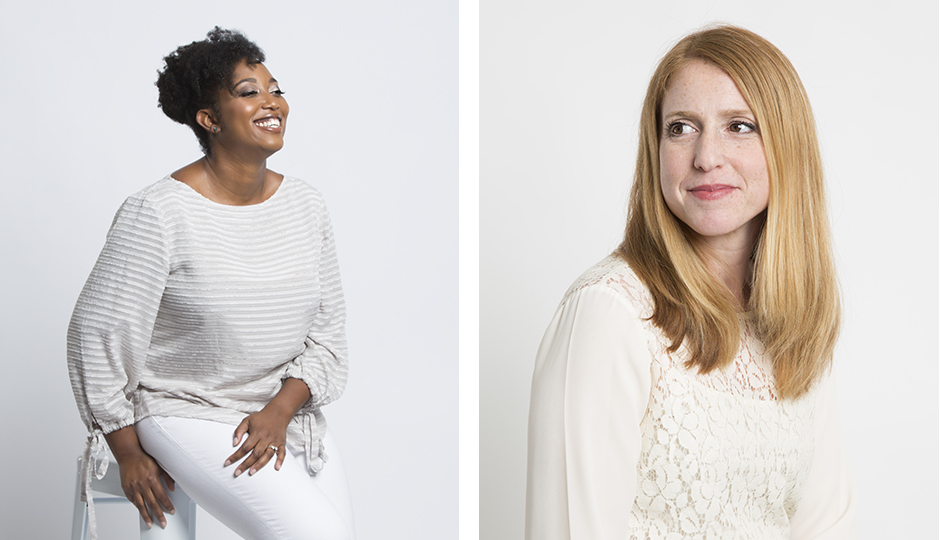
Left to right: Dannielle Figueroa and Samantha Matlin | Photographs by Nell Hoving
23. Our city needs to work harder to keep us here. (Read: Deal with the schools.)
Dannielle Figueroa, senior scientist with a pharmaceutical company
The biggest thing that comes to mind when I think about what would make life easier for a lot of women — moms, anyway — is more funding and more help for our schools. We have this great thing happening in Philly where we have families wanting to stay here, to keep Philly as their home. I moved here 10 or 11 years ago, and that wasn’t a thing then. Now we’re all trying to stay.
We were in the Meredith lottery for a kindergarten slot this year, and we got in. But it’s not something I want to advertise on the playground, because I know so many people who didn’t. I have friends who are moving. So many people move. It’s time — way past time — to figure out what we’ll do with schools to make things good and fair for everyone. Parents all fighting it out on their own isn’t the answer.
For my husband and me, it’d be easy to move to the suburbs. We both work outside the city. We choose to live here. But it becomes increasingly hard when you feel like you’re losing your community, your friends, and you don’t know where your kid is going to school. It takes over everything in your life. Everyone I know, we used to be interesting people who talked about lots of things. Now all we talk about is schools.
24. And speaking of schools … how about some choice?
Janine Yass, founder of Boys’ Latin charter school and school reform advocate
What I’ve thought every day since we moved to the suburbs when my first two kids were approaching school age — what I wake up with every day — is this: Why can’t Philly moms have choices for their kids’ education like I was able to?
What Philly moms need and want is what all moms need and want: choice, and control of their kids’ education. Right now, that’s controlled by the school district. Lots of moms don’t have any choice but to send their kids to persistently failing schools … unless they happen to have tested into a magnet, live in Society Hill or one of the other couple of high-income zip codes, or are lucky enough to win a seat in a charter lottery.
It would be great if moms could mobilize to demand that the school system work for them and not just for the people who are employed there. If moms were getting what they wanted, there wouldn’t be waiting lists of 25,000 kids to get into other schools. And the fact is, there is money in the system here; they just approved a $3 billion budget. If we changed the way the school district operates, that money could follow the child instead of floating a system that’s just not working for everyone.
Look at other cities: In L.A., if parents don’t want to send their kids to a failing school, if a majority of the parents vote to turn the school into a charter or private school, the city has to do that. It’s very challenging, in this city and in Pennsylvania, to change the way things are done. But we need moms to band together and demand more choice and more control for their families. Or else it won’t happen.
25. Businesses should do more for the next generation.
Jerilyn Dressler, accountant
I would love to see a formal partnership between the School District of Philadelphia and companies based in Philly. Here’s my vision: The SDP would have an office of “corporate partnerships,” which would focus on employees of various companies mentoring high-school students in a structured way.
When I worked for Ernst & Young in New York, I participated in such a program. I believe the companies paid fees to participate, so it was self-sustaining — and we were paired up with a high school in the South Bronx. I was matched with a student named Jessica, who was a shy 10th-grader when we met, with two siblings and a single mom. EY reimbursed us for any expenses incurred during the program, so I was able to take her out to dinners and to plays and art/historical sites. I helped her get free SAT tutoring and college counseling. We talked about her goals, about her dreams. She called to tell me when she did well on a test. She became the first person in her family to attend college. At her high-school graduation, the hugs I got from her and her family made for one of the best moments of my life.
With the high levels of poverty in our city’s schools, I think a program like this in Philly could do so much for our girls — and boys, too. It could take just one person to change the trajectory of a young person’s life.
First published as “What Philly Women Need (By Philly Women)” in the July 2017 issue of Philadelphia magazine.


